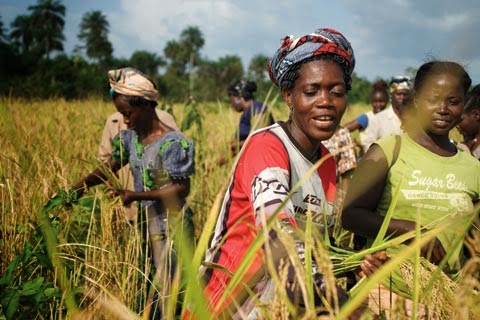Nigeria was able to avert major food crisis aftermath of the 2012 flood in major parts of the country that affected many farms, but countries in the horn of Africa are not that lucky with the ravaging droughts with devastating effects on crops and livestock production.
These are effects of climate change that are already posing challenges to the production food and abilities of some countries in the continent to feed the growing population of the continent.
Speaking at the presentation of the 2014 African Agriculture Status Report (AASR) prepared by the Alliance for a Green Revolution in Africa (AGRA), former President of Ghana and the UN Secretary-General's Special Envoy on Climate Change John Kufuor, said one of the key sectors that is already and will increasingly be affected by climate change is agriculture.
"Rapid and uncertain changes in rainfall patterns and temperature regimes threaten food production, increase the vulnerability of African smallholder farmers, and can result in food price shocks and increased rural poverty." He noted that even the low-input smallholder agriculture of sub-Saharan Africa, is both a 'victim and a culprit' relative to climate change.
The agricultural sector in Africa today is dominated by smallholder farmers that make their living from growing crops and keeping livestock on small plots of land. Outputs levels are generally low and insufficient to feed their families throughout the year and generate any sizeable income.
African farmers' output are constrained by inherently low soil fertility, poor access to inputs such as improved seeds and fertilizers, and insufficient transport , storage and marketing infrastructure that limits access to output markets among other factors.. As the continent strives to feed its growing population, climate change will continue to present further complications to millions of people for whom achieving food security is already problematic.
The smallholder farmers are particularly vulnerable to the climatic, economic shocks and major weather shocks. Ms. Jane Karuku, President of AGRA said "Smallholder farmers are the mainstay of food production across sub-Sahara Africa. As climate change turns up the heat, the continent's food security and its ability to generate economic growth that benefits poor African, most of whom are farmers, depends on our ability to adapt to more stressful conditions."
Small scale family farmers across Africa, already struggling to adapt to rapidly rising temperatures and more erratic rains, risk being overwhelmed by the pace and severity of climate change, according to the 2014 African Agriculture Status Report (AASR). Though the former Ghanaian President said although developing countries, especially those in Africa, are likely to bear the brunt of climate change, none of us will be immune to its impacts. "It is time we acted together and be reminded that, when it comes to the devastating effects of climate change, we all swim - or sink - together. This is not the time to play the blame game. "
The Alliance for a Green Revolution in Africa brought together over 100 African scholars to prepare a report that provides the most comprehensive review to date of how climate change will affect Africa's smallholder farmers and highlights the most promising paths to producing more food, even in the midst of challenging growing environments.
The 2014 African Agriculture Status Report (AASR), which focused on Climatic Change and Smallholder Agriculture in Sub-Sahara Africa, was presented at the African Green Revolution Forum (AGRF) during the week in Ethiopia.
By Jimoh Babatunde

No comments:
Post a Comment